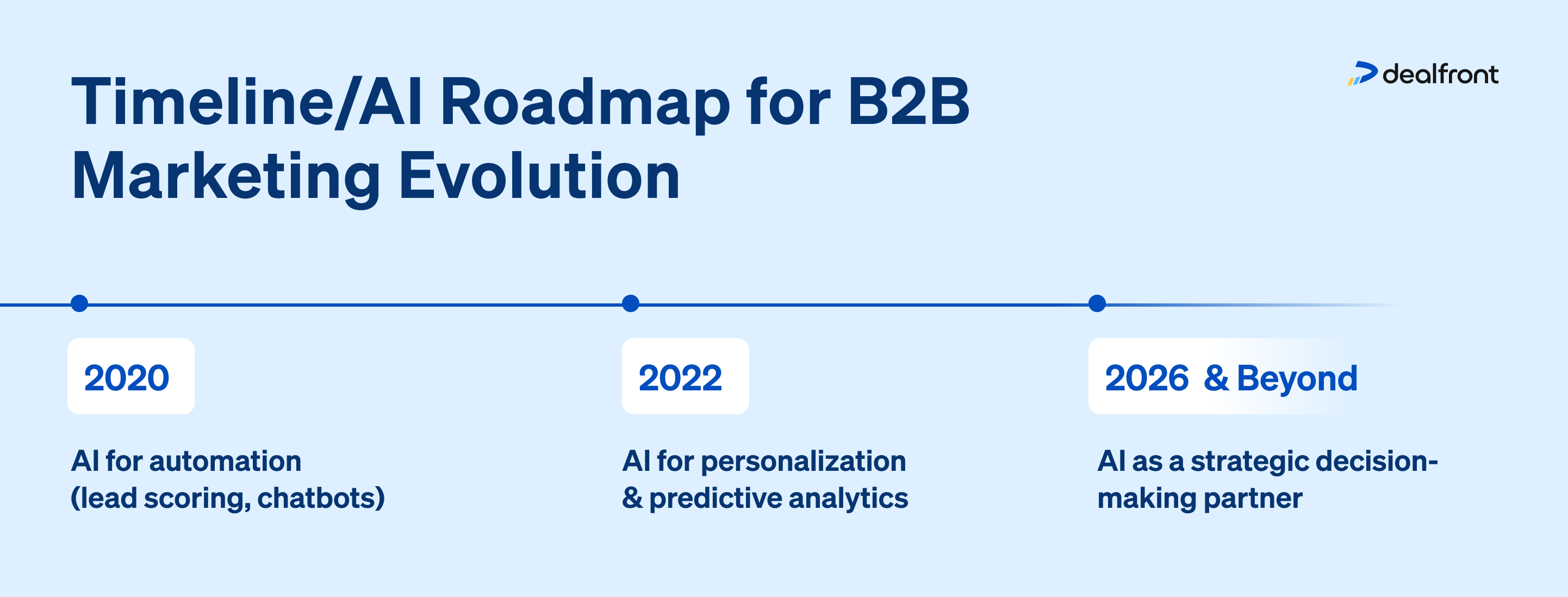The Future of B2B: Harnessing AI Automation to Drive Success
The landscape of B2B is moving as companies significantly turn to AI automation for critical advantage. This transformation guarantees to enhance effectiveness and customer interaction via sophisticated modern technologies. The combination of these devices is not without its challenges. Comprehending just how companies can browse this developing surface will be essential for future success. What aspects will establish the performance of AI in this field? The answers might redefine typical business designs.
Recognizing AI Automation in B2B
As businesses progressively seek performance, understanding AI automation in B2B becomes necessary. AI automation describes making use of synthetic knowledge innovations to simplify and boost organization processes. In the B2B industry, this includes the assimilation of AI devices to take care of jobs such as information evaluation, client communications, and supply chain operations. By leveraging machine knowing and all-natural language handling, business can improve precision, minimize human mistake, and quicken decision-making (Growth Systems For B2B). AI automation helps with the handling of big volumes of information, making it possible for organizations to remove valuable insights and optimize their operations. As organizations navigate this technological landscape, a detailed grip of AI automation's capabilities will empower them to remain affordable and receptive to market demands
Key Benefits of AI Automation for Services
While several organizations face raising functional needs, AI automation presents countless benefits that can significantly enhance their performance. One considerable advantage is performance; AI systems can carry out repetitive tasks much faster and with better precision than people, consequently releasing and minimizing errors up employees for even more critical efforts. Furthermore, AI automation enables data-driven decision-making by assessing substantial datasets swiftly, offering insights that educate service techniques. Price decrease is one more key advantage, as automation reduces labor costs and maximizes resource appropriation. In addition, AI can improve scalability, allowing organizations to adapt to market changes quickly. Inevitably, the integration of AI automation promotes development, making it possible for business to continue to be competitive in a quickly evolving landscape.
Changing Customer Experiences With AI
AI is reshaping customer experiences by making it possible for customized interactions and boosting interaction. Via the application of anticipating analytics, businesses can expect consumer needs and preferences, bring about much more customized solutions. Additionally, improving assistance procedures with AI innovation boosts efficiency and contentment, ultimately transforming the general client trip.
Personalized Interactions and Interaction
Individualized interactions have ended up being a foundation of reliable consumer engagement in the B2B landscape. By leveraging AI-driven services, services can customize their interaction and offerings to satisfy the unique requirements of each customer. Automated systems evaluate customer habits, information, and choices, allowing organizations to produce personalized experiences that resonate with their audience. This level of personalization not only boosts consumer satisfaction but also fosters lasting commitment. In addition, AI tools help with real-time interactions, allowing organizations to react without delay and properly to queries and comments. Because of this, companies can construct more powerful connections with clients, ensuring that their solutions straighten with progressing assumptions. Ultimately, individualized involvement through AI results in enhanced outcomes and continual success in the affordable B2B market.
Predictive Analytics Execution
As organizations progressively seek to improve customer experiences, carrying out anticipating analytics has become an essential technique in the B2B field. By leveraging data-driven insights, companies can anticipate client demands and preferences, allowing them to customize their offerings much more properly. Anticipating analytics utilizes advanced algorithms and historic data to forecast future habits, enabling services to recognize possible challenges and possibilities. This aggressive technique not just improves consumer complete satisfaction yet additionally promotes loyalty by supplying appropriate and prompt options. In addition, anticipating analytics aids in source appropriation, making sure that marketing initiatives are concentrated on high-value leads. Eventually, the combination of anticipating analytics outfits B2B firms with the devices necessary to transform customer interactions and drive long-lasting success in a significantly affordable landscape.
Simplifying Assistance Procedures
Enhancing consumer experiences in the B2B field expands past anticipating analytics; streamlining assistance procedures plays an important role. By integrating AI-driven solutions, companies can automate routine inquiries and improve feedback times, bring about enhanced consumer satisfaction. Chatbots and online aides supply 24/7 support, resolving customer needs without delay and lowering the worry on human representatives. This automation enables teams to concentrate on complex concerns, cultivating more meaningful communications. AI tools can analyze assistance data to recognize patterns and areas for renovation, guaranteeing continuous improvement of service top quality. As organizations take on these modern technologies, they position themselves as receptive and customer-centric, ultimately driving commitment and business development in an increasingly affordable landscape.
Improving Workflow and Processes
Improving procedures and processes in B2B settings is vital for enhancing general performance. By maximizing process performance and automating routine tasks, organizations can decrease hand-operated errors and liberate beneficial resources. This change not only boosts productivity but also makes it possible for teams to concentrate on tactical efforts that drive development.
Optimizing Process Performance
Optimizing process effectiveness is essential for services looking for to improve and decrease operational expenses performance. By analyzing existing processes, organizations can determine traffic jams and redundancies that prevent efficiency. Applying streamlined procedures enhances communication and partnership among teams, guaranteeing that jobs are completed extra promptly. Using data-driven insights makes it possible for business to make educated choices that improve operations additionally. Furthermore, taking on incorporated technologies can facilitate seamless information flow, minimizing the risk of mistakes and hold-ups. As services accept these modifications, they not only foster a more agile job setting yet additionally place themselves to respond quickly to market demands - AI Automation For B2B. Inevitably, concentrating on operations effectiveness enables organizations to allocate sources properly, driving lasting success in a progressively competitive landscape
Automating Routine Jobs
Several companies are progressively turning to automation to handle regular tasks, acknowledging its potential to substantially improve operational efficiency. By releasing AI-driven services, companies can enhance repetitive activities such as data entrance, billing handling, and customer questions. This change not only reduces human mistake but additionally maximizes valuable employee time, enabling staff to concentrate on tactical efforts and value-added tasks. Furthermore, automation can boost reaction times and service uniformity, bring about enhanced customer satisfaction. As services navigate an affordable landscape, leveraging automation for regular tasks comes to be vital for optimizing process and keeping agility. Inevitably, this strategy cultivates innovation and drives growth, positioning companies for long-lasting success in the advancing B2B setting.
Enhancing Decision-Making Via Data Insights

Getting Rid Of Difficulties in AI Application
AI execution holds the assurance of significant operational improvements, organizations frequently deal with a myriad of difficulties that can impede development. Secret obstacles include information high quality concerns, as many enterprises struggle with inconsistent or insufficient datasets essential for effective AI training. Additionally, resistance to transform within the labor force can restrain the adoption of AI innovations, as workers might fear job variation or lack the needed abilities. Spending plan restrictions likewise offer a challenge, limiting financial investment in the needed infrastructure and skill. Moreover, integrating AI systems with existing procedures can be complicated, demanding significant time and sources. Getting rid of these challenges necessitates a critical technique that includes extensive training, adjustment management, and a commitment to continual renovation in AI initiatives.
Future Trends: The Following Frontier in B2B Automation
While the landscape of B2B automation remains to advance, emerging trends are poised to redefine just how organizations operate. The combination of innovative synthetic intelligence will assist in more tailored customer experiences, permitting services to customize remedies specifically to client requirements. Furthermore, the surge of predictive analytics will allow organizations to prepare for market shifts and enhance decision-making procedures. Automation of routine jobs through robotic procedure automation (RPA) will improve performance, reducing operational costs substantially. Additionally, the fostering of blockchain modern technology promises enhanced openness and security in transactions. As these advancements gain grip, companies will increasingly take advantage of AI-driven insights to cultivate cooperation, enhance supply chains, and improve total productivity, marking a transformative shift in the B2B landscape.
Often Asked Concerns
What Kinds Of Organizations Can Benefit Most From AI Automation?
Manufacturing, logistics, and customer care companies can benefit most from AI automation. These markets boost functional performance, lower costs, and improve customer interactions, ultimately leading to increased productivity and success in an open market.
How Can Small Companies Execute AI Automation Efficiently?
Small companies can implement AI automation effectively by identifying recurring jobs, selecting easy to use tools, guaranteeing ample training for employees, and slowly incorporating remedies to maximize operations while monitoring efficiency and readjusting methods based upon responses.
What Prevail Misconceptions Concerning AI in B2B?
Typical misconceptions about AI in B2B consist of the idea that it is only for huge business, that it ensures instantaneous outcomes, which it can totally change human decision-making instead of boosting it. Growth Systems For B2B.
Just How Does AI Automation Impact Worker Duties and Task Protection?
AI automation reshapes employee functions by streamlining recurring tasks, promoting effectiveness and technology. While some fear task loss, it often develops chances for upskilling and brand-new settings, ultimately enhancing work safety and security via added worth and performance.
What Abilities Are Required to Manage AI Automation Projects?

As organizations significantly seek effectiveness, comprehending AI automation in B2B comes to be important. AI automation assists in the handling of big quantities of data, allowing services to remove valuable understandings and optimize their procedures. While numerous services grapple with increasing functional needs, AI automation presents numerous advantages that can substantially boost their performance. Automation of routine jobs via robotic procedure automation (RPA) will improve effectiveness, decreasing operational expenses significantly. Production, logistics, and customer solution companies can profit most from AI automation.